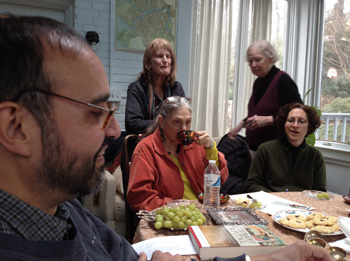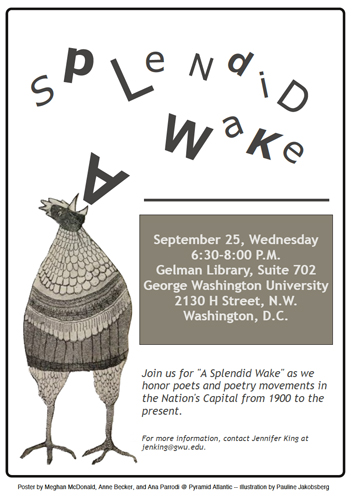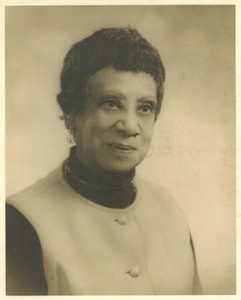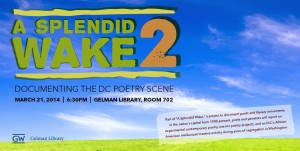Volume 15:4, Fall 2014
A Splendid Wake Issue
Introduction by Myra Sklarew
The invitation to serve as guest editor of Beltway Poetry Quarterly arose from a project begun approximately three years ago, when it became apparent that we were losing many in our poetry community and that we wanted to document their lives and contributions. Elisavietta Ritchie came up with the phrase, A Splendid Wake in reference to the death of Ann Knox, a poet who left us immediately after giving a reading of her poems, a notable way to bid us all farewell.

“A Splendid Wake” planning committee meeting. From left to right: Sunil Freeman, Elisavietta Ritchie, Anne Becker, Myra Sklarew, and Jennifer King.
The project got underway. A Splendid Wake arose from a desire to honor the poets of the past decades and to create, in this digital age, a Wiki to help document and preserve the remarkable history of Washington poetry from 1900 through the present. Articles about the poets, poetry movements, publications, readings, sponsoring institutions, recordings and broadcasts provide a picture of the diverse and unique life of poetry that evolved over more than a century in and around the Nations Capital. Jennifer King with George Washington Universitys Gelman Library has taken on the huge job of creating the archival set-up and the site has expanded greatly, demonstrating a stunning array of poetic activities.
Public Programs and Blog
 In addition, we put on a pubic program each year to highlight various aspects of our collection. In September 2013, our program included DC Councilman Jim Graham on Walt Whitman; Christopher Sten on Jean Toomer, and Dolores Kendrick on May Miller. Other highlights included Brian Gilmore on Poetry as Jazz: Rhythm and Blues, Hip Hop and Rap; and Kim Roberts on poems in the anthology Full Moon on K Street: Poems about Washington, DC.
In addition, we put on a pubic program each year to highlight various aspects of our collection. In September 2013, our program included DC Councilman Jim Graham on Walt Whitman; Christopher Sten on Jean Toomer, and Dolores Kendrick on May Miller. Other highlights included Brian Gilmore on Poetry as Jazz: Rhythm and Blues, Hip Hop and Rap; and Kim Roberts on poems in the anthology Full Moon on K Street: Poems about Washington, DC.
Other speakers included E. Ethelbert Miller, Grace Cavalieri, Karren LaLonde Alenier, Richard Peabody, Merrill Leffler, Luis Alberto Ambroggio, Sarah Browning, Terence Winch and Teri Cross Davis, covering a huge variety of material, too lengthy to include here, but available on our Wiki.
A second program took place on March 21, 2014 with a more central focus around three areas: Experimental Contemporary Poetry, Warrior Poetry Projects, and DCs African American Literary Activity, 1900-1965. Speakers were Geneva Henry, William Rivera, Jennifer King, Silvana Straw, Magus Magnus, Natalie E. Illum, Derrick Weston Brown, Sunil Freeman, Frederick Foote, Maritza Rivera, Jim Beall, and James Counts Early.
Our next Public Program will take place on Friday, March 20, 2015 on the 7th floor of the Gelman Library, George Washington University.
In addition to the Wiki, Karren Alenier has created The Splendid Wake-Up Blog that is added to monthly by participants, to augment this effort.
Building a Supportive Community
Ive often wondered how it was that writers and performers in DC didnt compete with one another but supported each others work whole-heartedly. Was it because there was never a publishing industry here, that there was no business side to compete over? In cities like New York, it is a different matter. Or was it something else?
There has been a surprising growth of small press publications over many years in Washington, each unique in style and purpose.
At the heart of this city, Howard University brought to us the most remarkable men and women, over many generations: artists, musicians and composers, dramatists, poets and prose writers, philosophers. When Betty Parry gathered African Americans from every discipline for In the Shadow of the Capitol at the Folger Shakespeare Library, one of the most striking conferences Ive ever experienced, and proceeded over many months to interview the participants, we had a glimpse of the richness here. I will never forget the words of the young people who attended that conference, their astonishment that men and woman born, like Sterling A. Brown, around the turn of the century, had grown up with parents who were born into slavery or only shortly after Emancipation. That these accomplished people could have not only survived the painful racism in this country, but fulfilled their lives in such extraordinary ways.
And it was a remarkable thing that a Dutch resistance fighter in the Second World War had done her doctoral thesis on the Howard poets and had learned about the tradition from which they had come, so that when she was incarcerated in a concentration camp, she sang spirituals to comfort those who were with her. And afterwards, she published a book in 1962 in England, Beyond the Blues, that included the poems of Arna Bontemps, Gwendolyn Brooks, Sterling Brown, Countee Cullen, Margaret Danner, Owen Dodson, Walt De Legall, W.E.B. Dubois, Mari Evans, May Miller, Percy Johnston, Raymond Patterson, and many others. I remember too that it was a time when it was difficult for African Americans to publish their poetry. Gwendolyn Brooks, who was successful in having a major New York publisher, withdrew her work and went to Broadside Press with Dudley Randall. And I remember Harpers then reprinted work of hers to which they still had the rights. These were tough times. Rosey Pool came to the US after the war and visited churches throughout the south and schools to teach Americans about their rich heritage. A great irony!

May Miller, undated photo, courtesy of the Manuscript, Archive and Rare Book Library, Emory University.
Then, have a look at what was going on in our city through the lens of those included in this issue of Beltway Poetry! I only wish I had even a small piece of another lifetime to share what I have learned and to continue learning. Sometimes I think we live backwards. Perhaps we should start at the end! Ive only just begun to really learn about my friend May Miller Sullivan. Rereading her remarkable plays. In Nails and Cross her characters focus not on what is done to the African Americans by white people, but what the cost is to those who bring the harm. She understood early on the permanent damage done to the aggressor and to the bystander. David Gushee wrote: If one is present, one is taking part. From a moral point of view there may be no such thing as a bystander.
So, welcome to this issue of Beltway Poetry Quarterly. My grateful thanks to Kim Roberts who does so much for our literary community and to all who contributed.
Myra Sklarew was educated at Tufts University and the Writing Seminars at Johns Hopkins University. She studied at Cold Spring Harbor Biological Laboratory with Salvador Luria and Max Delbruck and conducted research in frontal lobe function of Rhesus monkeys at Yale University School of Medicine. She is the author of 17 collections of poetry, fiction and essays including Invitation to a Country Called Aging (co-written with Patricia Garfinkel, Politics & Prose Books, 2018), Harmless (Mayapple Press, 2010), The Witness Trees (Cornwall Books U.S./London/Dora Teitelboim Center for Yiddish Culture, 2000, reprinted 2007), Lithuania: New & Selected Poems (Azul Editions, 1995), and the forthcoming A Survivor Named Trauma: Holocaust Memory in Lithuania (SUNY University Press). Awards include the PEN Syndicated Fiction Award and the National Jewish Book Council Award in Poetry for From the Backyard of the Diaspora (Dryad Press, 1981). She is the former president of the Yaddo Artist Community and professor emerita in the Department of Literature, American University. To read more by this author: Five poems, Winter 2004, Whitman Issue, Myra Sklarew on May Miller: Memorial Issue, and Myra Sklarew on Leon-Gontran Damas: Forebears Issue
